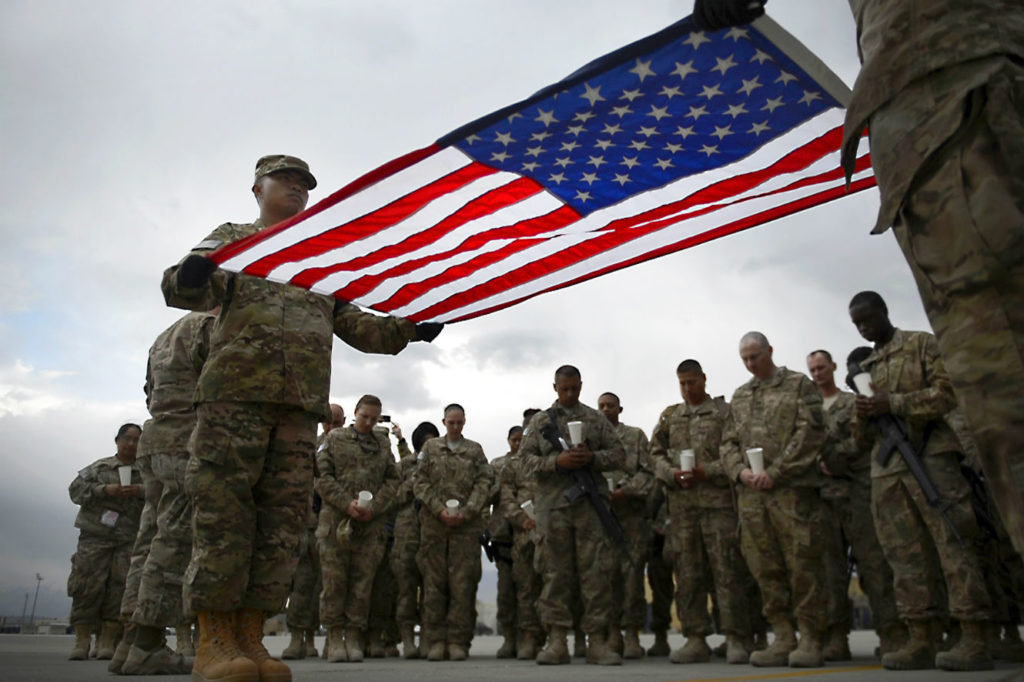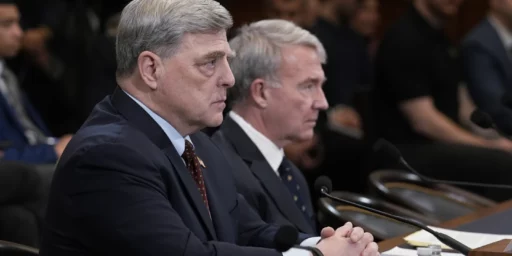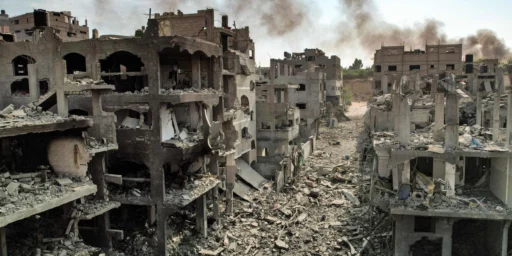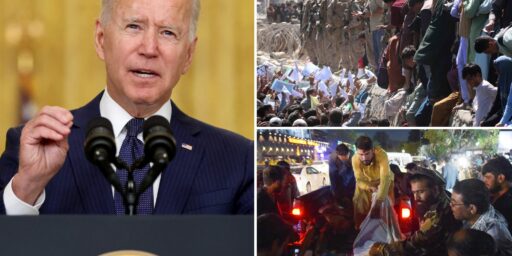Generals Say Afghan Exit Would Have Been Smoother Had Biden Listened to the Generals
Two unclassified after-action reports shine a new---if one-sided---light on the evacuation.

Dan Lamothe reporting for WaPo (“Declassified Afghanistan reports back U.S. commanders who said Biden team was indecisive during crisis“):
Declassified U.S. military analyses of the calamitous exit from Afghanistan detail repeated instances of friction between American troops and diplomats before and during the evacuation, concluding that indecisiveness among Biden administration officials and initial reluctance to shutter the embassy in Kabul sowed chaos and put the overall mission at “increased risk.”
Two “after action” reports were prepared by officials assigned to U.S. Central Command in September, about three weeks after the final planeload of military personnel departed Hamid Karzai International Airport. The assessments appear to affirm separate accounts of senior U.S. commanders frustrated by what they characterized as sloppy, misguided management of the withdrawal.
As The Washington Post first reported Tuesday, military leaders who coordinated the evacuation fault officials in the White House and the State Department whom, they say, failed to respect the Taliban’s swift advance last year and resisted pleas from the military to prepare for an evacuation weeks before Kabul’s fall.
The declassified after-action analyses are contained within an official report detailing the military’s investigation of an Aug. 26 suicide bombing outside the airport’s Abbey Gate that killed an estimated 170 Afghans and 13 U.S. service members. The report, obtained by The Washington Post through a Freedom of Information Act request, comprises dozens of witness interviews, findings of fact, and other official government records. Spanning 2,000 pages, it presents the most extensive, unvarnished account to date of the United States’ 17-day race to end its longest war.
The existence of the after-action reports contradicts claims made Friday by White House press secretary Jen Psaki, who has joined President Biden and other administration officials in seeking to downplay the significance of U.S. commanders’ remarks.
“I think it’s important for people to understand that there was no after-action report,” Psaki told reporters in the White House briefing room.
A National Security Council official — who, like some other officials, spoke on condition of anonymity because of the sensitivity of the issue — said Saturday that Psaki’s statement from the podium referred to a forthcoming, more extensive review of the war’s endgame.
“Many people have wrongly conflated the Abbey Gate report and documents released to The Washington Post with the Pentagon’s after-action review of Afghanistan — a broad report that will examine the final months of America’s longest war, beginning in February 2020,” the official said, referencing the month that President Donald Trump made a deal with the Taliban, setting the stage for a withdrawal of all U.S. troops.
So, I think this is unfair to Psaki. There were doubtless dozens of “after-action reports” by various military organizations. The practice has long been embedded in the culture. Whether she knows that, I have no idea. But I believe her answer was indeed about a forthcoming, comprehensive report that will have been staffed through the interagency.
For that matter, even though I draw a paycheck from the Defense Department and have done so off and on throughout my career, it seems obvious even from Lamothe’s description that the AARs he got through the FOIA request are one-sided. That the military brass, which is understandably more tied to sunk costs than diplomats and administration officials, were frustrated by the timetables and the failures to provide more security, is hardly surprising. But, after all, they didn’t want to leave to begin with. The generals never want to abandon a mission that hasn’t been accomplished—even if it’s been ongoing for two decades and accomplishment is a fool’s errand.
Still, the report is damning:
President Biden said in an interview with NBC News on Thursday that he was “rejecting” the commanders’ accounts, though White House officials said later that he accepted the narrow, overall findings of the Abbey Gate report. On Tuesday, State Department spokeswoman Jalina Porter described the comments of the military officials as having been “cherry-picked” from the larger report. A State Department official said Saturday that he could not comment on the Defense Department’s after-action analyses.
The after-action reviews included in the Abbey Gate report were completed by U.S. Forces-Afghanistan Forward, the military headquarters that oversaw the withdrawal, and Joint Task Force-Crisis Response, a unit led by the U.S. Marine Corps that also was involved. Their findings closely hew to observations made by Rear Adm. Peter Vasely and Brig. Gen. Farrell Sullivan, who were responsible for coordinating the evacuation.
The after-action report by U.S. Forces-Afghanistan Forward, which Vasely oversaw, is dated Sept. 24 and titled “Operation Allies Refuge,” the name the Biden administration assigned to the evacuation mission. It determined that decisions to delay reducing the size of the U.S. Embassy’s staff in Kabul and declare a formal evacuation of American citizens and Afghan allies complicated the military’s ability to execute its mission.
An Aug. 10 interagency tabletop exercise to rehearse the evacuation “identified the deteriorating situation which predicted the full isolation of Kabul within the next 30 days,” but no decision to evacuate was made then, according to the report. Instead, a day later embassy staff informally requested military support to gradually downsize and shift operations to the airport “over a 17 day period,” the report said.
In their witness statements to Army officials investigating the airport bombing, Vasely and other officers described the delayed evacuation as fateful.
U.S. troops would have been “much better prepared to conduct a more orderly” evacuation, Vasely told the investigators, “if policymakers had paid attention to the indicators of what was happening on the ground.”
Even the tabletop exercise didn’t predict a collapse as rapid as the one that ultimately happened.
Regardless, “frictions” are simply inevitable. The military brass will always be in maximum “security” and “force protection” modes whereas diplomats will naturally want the embassy as open as possible in order to conduct operations. Further, months into a new administration, the National Security Council team is just starting to take shape, making coordination even more challenging than usual.
The Biden team doubtless made mistakes here although they and commanders on the ground adjusted remarkably quickly to an incredibly chaotic situation. And I’m not sure our hasty withdrawal could have been pulled off smoothly under the circumstances.






This from the same military brass whose council was, we’re turning the corner, it will only require a few thousand troops and a few years. The same military brass, whose intelligence groups believed that the Afghan government could hold out for 6 months to 2 years. The same military brass that
could notrefused to see that the Taliban had compromised the Afghan military throughout the provinces.@Sleeping Dog:
This has been my biggest question since the withdrawal: how was it possible we had so little insight into what was actually going on in Afghanistan in the aftermath of Trump’s horrendously misbegotten deal with the Taliban?
I mean, anyone with two brain cells to rub together could figure out how “hey, leave our guys alone during an election year and I’ll give you the country” was going to play out. How the hell did we miss it? This has to be one of the worst failures of both intel and analysis in American history.
Generals who lost 20 year war to hillbillies with bolt action rifles yell, “squirrel!”
@Sleeping Dog: This is what I mean by the sunk cost issue: having lost troops and devoted energies to the problem, the generals are in poor position to evaluate. They’re always going to want more time and other resources to get the job done.
@Mikey: Indeed.
@Michael Reynolds: The problem with “win” or “lose” in these situations is that it’s an uneven game. As in Vietnam, US forces absolutely dominated the opposition at a tactical level. The problem, though, is summarized in the adage “We’ve got the watches, they’ve got the time.” The Taliban could “win” by simply still being willing to fight once the US attention span faded. That we lasted twenty years in a fight that benefited us zero is remarkable in pretty much every way.
I’m just glad we’re out.
I am regularly frustrated by breezy references to the “disastrous pull out” from Afghanistan, particularly when they appear to be referencing the airport and Abbey Gate. Those losses of life, both Afghani and U.S. are tragic. But, still, “disastrous” as compared to what? We were pulling out of a 20-year war. What did anyone think was going to happen? There could have been better outcomes, but it seems to me way more likely that there could have been worse ones.
Is there a latin term for the fallacy of perfection? “This isn’t perfect, therefore this is bad.” “Masks don’t 100% stop infection or spread, therefore masks are bad.” “Biden may not have responded perfectly to a suddenly developing crisis in which he had limited options, therefore Biden is bad.” I mention this because it’s so common on the right. Can we point to anything Republicans have done that worked as advertised? But Stacey Abrams got caught not wearing a mask once,
We’re out. After an initial day of confusion the airlift went smoothly. We got everybody out except maybe a few edge cases. We lost 13 troops to a bombing by a third party, ISIS. (A group birthed by W’s big adventure in Iraq. And not mentioning local civilian casualties because almost no one else ever does.) The withdrawal went more smoothly than anyone had a right to expect. But everybody’s going to pile on. And did I mention we’re out.
@James Joyner:
I understood that, I was trying to beat this particular intellectual snake to death with a hoe.
@James Joyner:
Ten years in – when it was patently obvious what the outcome would be – why didn’t the generals put on their big boy uniforms, go to Congress and say, ‘this is a waste of lives and money.’ Yes, I’m sure there were ‘voices in the Pentagon’ whispering the truth, but not to us, not to the American people.
But now they’ve found their voice, when it’s too goddam late. Suddenly they don’t seem worried about being discreet. Suddenly they don’t seem to mind criticizing their Commander in Chief. Useless while men died, useless while we pissed away a trillion dollars, but now, sitting in the ashes of their own fire they find their voice.
This has been two decades of moral cowardice, a thing of which we have way too much in modern America, and about which we are way too forgiving.
But in no way good.
Given that, IIRC, the original response by the administration to plans for getting Afghanis who assisted our troops out was *Foxtrot Tango Sierra! We got away with not doing it in Vietnam,* there was no reason for me to believe that the withdrawal was going to be better than it was. But I’m sure that having paid more heed to the military leadership would have led to a different debacle than the one we had–if only because it might have been months or years later.
Bottom line – had Biden listened to the generals, we’d still be there.
There were huge protests against the Iraq war, barely covered by the supposedly liberal MSM. The Dirty Fucking Hippies thought there was no good reason for it, that a lot of people would be killed, and in the end we’d accomplish nothing. The administration, DoD, and the foreign policy establishment saw clearly how U. S. security depended on invading Iraq. So the DFHs were right, but for all the wrong reasons, and the Blob was wrong, for all the right reasons. Again.
The generals kept us in a messy war for decades. The mistakes made in getting out we’re far less than the mistakes made when staying for all that time.
It’s her job to know and to be clear when she doesn’t know.
While I trust this administration more than the previous administration, they do have a problem of not being transparent, not showing their work, and getting testy about it when called on it.
The responses to questions about the recent attack that killed the ISIS leader leaps to mind. And when we blew up an aid worker’s family while leaving Afghanistan. This post touches on a lot of that:
https://www.outsidethebeltway.com/secrecy-and-democracy/
@gVOR08: As former (mis-)Representative Michele Bachmann expressed it so eloquently a decade before about a neighboring nation that was the
victimrecipient our attempts to build democracy (going from memory, so no quotes): That nation is ours now. We paid for it with our blood and treasure. They have to do what we tell them to.Really? I wish they would explain it to me because it sure as shit wasn’t about WMDs.
From what the generals have said, I assume that an organization that has gamed out some of the most improbable conflicts imaginable didn’t bother to game out a situation that was pretty much baked in when Trump left office. If I were in Biden’s place, I’d certainly be tempted to call some of them in and ask, “Why shouldn’t I replace you for incompetence?”
@OzarkHillbilly: I was, of course, being snarky, and quoting various arguments I’ve seen. W never publicly stated a reason that wasn’t later falsified or absurd on its face. Bring democracy to the Middle East? GOPs don’t want democracy here. Only thing that makes sense to me is they wanted to get Iraqi oil moving again.
I swear to the Nine Gods, my reaction to the headline was “In other news, water is wet.”
Of course the generals think things would go better if their advice was followed. Who doesn’t think that? And of course, they can find some bit of advice they gave that was good advice.
Sigh. This strikes me as butt-cover, finger-pointing, and blame, none of which are that useful, but all of which are highly predictable in affairs between humans.
And I was being snarky right back. Sorry if you took my bite personal. It’s just that on the night of the beginning of “shock and awe” I was sitting in a pizza parlor when Bush got on the TV and announced it.
Somebody in the crowd said, “God bless America.”
I replied, “Fuck Bush.”
He came back with, “Who said that? I’ll kick their ass!”
And I came back with, “I did! And I’ve got 2 sons who could end up in that fuckin’ mess! What have you got???”
And the guy, who outweighed me by about 80 lbs and was a union carpenter same as I, sat down and stfu. He could have killed me but I was so pissed I didn’t care. A buddy of mine soon walked up to me and said, “C’mon Tom, this is not the time or place for that.”
Which pissed me off even more. I wanted to scream at him, “Well then, when is the time and place for it??????” but I didn’t. Not then anyway. A decade later I told him how I’d felt and that I was still pissed at him for saying that and he just said that he didn’t blame me, I had been right.
Well I guess even the commentariat at OTB can have a dumb day.
I won’t recap everything because I’ve already informed those willing to learn how these things work.
None of you (me excluded) have actually heard heard the assessments of “Brass” actually involved in Afghanistan. Oh, I’m sorry, you listened to Pentagon briefs and thought you were getting Military professionals honest assessments? Silly you. That’s not the way it works. If you read a Pentagon statement or see a General on TV. They are communicating information from the vantage point of the civilian leadership they work for.
They covered Trumps ass and they covered Bidens. When a General and the Administration is not in Alignment…the General is “retired”. The don’t operate like politicians. They are POTUSs military public affairs.
We were not in Afghanistan because “The Generals wanted it “. We were there because every Administration since Bush (i.e Obama) was terrified of the political optics of an attack on US soil after a withdrawal.
Yes, yes, some of you are going to google news articles to prove your version. Some of those stories were engineered for political cover. Now don’t be like the naive Trumpers we amuse ourselves ridiculing. We would have left Afghanistan had Obama did the same thing as Trump. He didn’t want to take the risk…and frankly I don blame him. With all the conspiracy shit he dealt with…a terror attack after a withdrawal would have constrained him even more than he already was. Frankly even a withdrawal by him would have played optically like a surrender. Untenable for his image and agenda.
Accept the Biden team shit the bed and move on.
Am I the only one who finds this report ridiculously self-serving? The generals all investigated themselves and, surprise-surprise-surprise, came to the conclusion they performed admirably and things only went wrong because everyone else screwed up.
Political considerations “complicated the military’s ability to execute its mission”? That made me chuckle. Shades of “fighting the Vietnam War with one hand tied behind our back”, not to mention “White House oversight of drone strikes impeding war on terror”. I doubt there’s been a military operation in modern times in which the generals weren’t frustrated by limitations imposed by civilian control. I seem to recall one General of the Army Douglas MacArthur having to be fired for expressing such frustrations.
The military’s mission was to secure the perimeter of the Kabul airport to allow the evacuation to proceed. It did an admirable job. I suppose it could have begun to evacuate people a few days earlier if instructed to do so, but it’s by no means certain they would have agreed to go while ever the Ghani government remained in Kabul and the Afghan army seemed to be resisting the Taliban’s offensive.
These are the same genius Generals who didn’t see a swift takeover of Afghanistan by the Taliban. Biden was right to get out. The U.S. gave the Afghans the tools they needed to fight the Taliban. However, the Afghan people were not willing to fight their current oppressors.